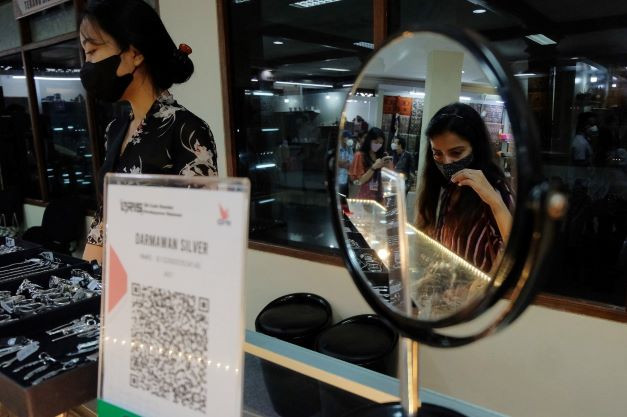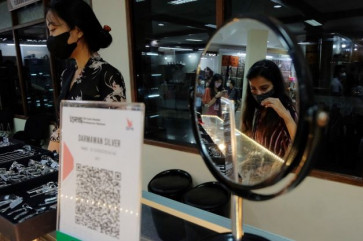Popular Reads
Top Results
Can't find what you're looking for?
View all search resultsPopular Reads
Top Results
Can't find what you're looking for?
View all search resultsThree payment evolutions as Indonesia goes cashless
Change text size
Gift Premium Articles
to Anyone
 Shopping time: A buyer seen in a mirror examines products made by micro, small and medium enterprises (MSMEs) exhibited in Werdhi Budaya Art Center in Denpasar, Bali, on May 13, 2022. The event was organized by the Finance Ministry and Bank Indonesia (BI) to promote the Quick Response Code Indonesian Standard (QRIS) cashless payment system.
(Antara/Nyoman Hendra Wibowo)
Shopping time: A buyer seen in a mirror examines products made by micro, small and medium enterprises (MSMEs) exhibited in Werdhi Budaya Art Center in Denpasar, Bali, on May 13, 2022. The event was organized by the Finance Ministry and Bank Indonesia (BI) to promote the Quick Response Code Indonesian Standard (QRIS) cashless payment system.
(Antara/Nyoman Hendra Wibowo)
I
ndonesia’s financial services industry is experiencing accelerated digitization. Bank Indonesia (BI) and entities such as the Indonesian Payment System Association (ASPI) are behind major developments in the non-cash payments sector, aimed at driving financial inclusion at large.
In the latest edition of our Global Payments Report 2022, we highlighted Indonesia’s move toward non-cash payments, which grew 30 percent in transaction volume from 2016 to 2021 and is expected to increase fivefold by 2031 as nontraditional payment options gain popularity.
The convenience of payments is increasingly becoming a value proposition that merchants are vying to offer their customers. As part of the Indonesia Payment System Blueprint 2025 (BSPI), the central bank is building its own payments infrastructure with the introduction of the Indonesian Standard QR Code (QRIS) and payment platforms such as BI-FAST, which already encompasses around 87 percent of the national retail payment system.
Payment networks are swiftly adapting to BI-imposed margin compressions via lowered or fixed fees in merchant discount rates (MDR) for QRIS transactions. For issuers, new payment methods such as Buy Now Pay Later (BNPL) and X-border are becoming instruments for customer loyalty.
These trends are leading to a surge in fintech funding, which in Indonesia is expected to have reached US$3.6 billion in 2022 based on investments in the first half of the year. While the ongoing crypto winter is likely to see more caution toward overvaluation of fintech firms, those invested in building a sustainable payments infrastructure with essential payment rails as well as merchant and issuer networks have a higher chance of long-term success.
This article explores three selected trends to watch over the next five years as Indonesia becomes a more cashless, financially inclusive society.

















